- Home
- Matt Goldman
Dead West Page 2
Dead West Read online
Page 2
“Heh,” said Jameson, a hint of a smile in his voice, “pack. You don’t got to pack for L.A. All you need is a T-shirt, pair of shorts, and flip-flops. Pack. Such a Minnesota boy.”
“No shit. That’s why I need you.”
3
Kenji Thao greeted us at the reception desk. He first came to Stone Arch Investigations as an intern from Harding High School. A handsome kid with kind eyes, a broad nose, and a big smile. He combed his thick black hair like young Elvis Presley and wore a wisp of unripe facial hair. He’d carved out a personal style of white shirts under suit vests. A pocket watch rested in one of the vest’s pockets fastened to a chain that ran across to the other pocket. I’d seen the actual watch once. Kenji’s only defect was he stood five feet ten inches tall, defying the Hmong stereotype of being short. I don’t care for it when people who are supposed to be short are taller than me. I blame hormone-infused milk of which I drank none because I’m lactose-intolerant.
“Hey boss,” said Kenji. “You going to California?”
“We are.” I handed him the envelope minus the check.
“What up, Jameson?”
Jameson nodded. “Kenji.”
“Please book us a flight leaving this afternoon, a nice rental car but not a convertible because I have delicate skin, and two rooms at a good hotel near the address in here.”
Jameson said, “And I got to fly first class. I don’t fit in coach.”
Kenji looked at me for approval. I gave it.
We walked toward Ellegaard’s office. Kenji said, “You want a seat in first class, Nils, or are you small enough to ride on Jameson’s lap?”
Anders Ellegaard sat at his desk reviewing a document, a highlighter in hand. Sunlight poured in through the window in the stone wall. Ellegaard squinted in the bright light. He kept his eyes on his work and said, “How did Beverly Mayer behave?”
“Her face smiled but the rest of her didn’t. You should come to Los Angeles with us.”
“Wish I could. Maisy and Olivia both have hockey tournaments this weekend. Molly and I have to divide and conquer. I’d send Annika with you if she wasn’t on vacation.” Annika Brydolf was our junior investigator. She’d taken her two kids to Florida—her first vacation in over ten years. Ellegaard looked up. He and Jameson exchanged nods. Ellegaard had approved paying Jameson’s way in return for him playing tour guide. Truth is, Ellegaard would have approved it even if Jameson had never been to Los Angeles. He loved the big guy just as much as I did.
Ellegaard smiled an easy smile. He had crow’s-feet around his eyes. I met him when we were both cadets at the Minneapolis Police Academy. Nineteen years later, he looked the same other than those crow’s-feet. And lines in his forehead. He looked like a boy with a man’s markings. I wondered if I’d always see him like that—if I were incapable of seeing him as a forty-one-year-old.
I placed the check on his desk. “Seems like a lot of money for almost no work. How well do you know Beverly Mayer?”
Ellegaard looked up and said, “Not well. But my parents know Beverly and Arthur’s son and his wife. Not that they run in the same social circle. My mother decorated their lake home, and they became friends. My parents spend weekends up in Brainerd with them.”
“Beverly said something about Ebben’s father squandering his trust fund.”
“He didn’t squander it. He started a foundation to narrow the achievement gap in Minnesota schools.”
“Wow. Beverly Mayer is a piece of work.”
“Not a nice woman by all accounts. Her son doesn’t talk to her.”
“What’s her grandson, Ebben, like?”
“I asked around before I sent you to the Mayers. I haven’t heard a bad thing about Ebben. Not from business associates. Not from family. Not from ex-girlfriends. He’s respected and well-liked. And if he’s investing in entertainment projects, no one cares other than Beverly Mayer. This job should be a paid vacation. Might as well enjoy it.”
Paid vacations, like free lunches, exist in the land of unicorns and once-in-a-lifetime investment opportunities. I said, “Did you hear Ebben’s fiancée died last week?”
“Yeah,” said Ellegaard. “His parents are concerned about him. I think Beverly’s just concerned about the money.”
Kenji Thao stuck his head into Ellegaard’s office. “Do you want to fly at 1:21 or 3:10?”
I turned to Jameson, “What do you think, boss?”
Jameson said, “1:21. The 3:10 would put us on the ground around 5:00 Pacific time. Los Angeles is a parking lot at 5:00.”
“Local knowledge. Can’t beat it.”
“Kind of just common sense, but whatever.”
I dropped Jameson at home to pack his T-shirts, shorts, and flip-flops and went home to do the same.
* * *
She had put the DO NOT DISTURB sign on the condo door to let me know the baby was napping. We had stolen the DO NOT DISTURB sign from the Fairmont Hotel in the Canadian Rockies. I asked her to marry me during that trip while hiking a trail high above the emerald-colored Lake Louise. It was mid-July, sunny, and warm. We trekked over what remained of an avalanche flow, which, the previous winter, had taken out thousands of pine trees. The avalanche had ripped the trees out by their roots and snapped them into bits. But the ice and snow captured and preserved the trees, keeping them fresh and green and fragrant like Christmas, even months after they’d been torn from the soil. I had planned on proposing at dinner, but the avalanche flow proved too picturesque and smelled like what I’d want heaven to smell like. So much beauty in the aftermath of destruction. It was just too damn symbolic of our romance. I had the ring with me because I didn’t feel safe leaving it in the hotel room. She said yes, and we continued up the trail, me with one wet knee.
I removed my shoes in the hall, turned the door handle like a safecracker, then tiptoed into the foyer. My fiancée sat on the couch, half under a wool throw, typing away on her laptop. She’d left work early to spend the afternoon with Evelyn Stahl-Shapiro. She had never wanted a baby, but in March we’d marry and that would officially make Gabriella Nuñez Evelyn’s stepmother. That thrilled Gabriella.
I looked at the baby monitor on the end table. Evelyn slept under her quilt. I wanted to go get her, but Gabriella thought we should let her sleep because Evelyn had a cold and needed the rest. She sucked a pacifier in her mouth and held one in each hand. I didn’t think it was a big deal that Evelyn still used a pacifier at ten months old, but Micaela and Gabriella wanted it gone. That was another beautiful gem in the aftermath of destruction. Micaela Stahl, my ex-wife, Evelyn’s mother, had embraced Gabriella Nuñez not only as my fiancée, but as Evelyn’s soon-to-be stepmother.
The aftermath of my failed marriage had spent its energy like a tsunami after an earthquake. It destroyed everything in its path. But it was over, and the seas had grown calm. Gabriella had to fight through insecurity and convention to trust that I had let go of Micaela. She’d succeeded. It’s what happens when you fall in love with a skilled cop—she knows when you’re lying and she knows when you’re telling the truth. Gabriella, even though she sometimes doubted it, understood I was emotionally free and clear to love her. And with each passing month, Gabriella’s trust grew to match what she knew. I loved her. Only her.
We all lug around baggage. Mine was I had been married to Micaela. Years after our divorce, we’d fall in and out of bed together. The physical part of our relationship lived while the emotional part died. We held on to it like Evelyn held on to her pacifiers. We didn’t think Micaela could get pregnant so we did nothing to prevent the possibility. Then without telling me, Micaela took clomiphene and got pregnant at forty years old. The baby certified the death of our romantic relationship. It was as if Micaela and I were meant to have a baby together. Nothing more.
I’d met Gabriella when we were in our early twenties, both cadets at the Minneapolis Police Academy with Ellegaard. Micaela had known her for years—the two had always liked each other. That made for an un
conventional but functional family. Micaela and Gabriella read the same parenting books and bored me with the same conversations about sleep training and diet and waiting lists for preschools.
I sat on the couch next to Gabriella, wriggled my way under the blanket, and kissed her.
Her dark eyes shined. Her black hair fell straight to the middle of her back. She said, “Thank you.”
“Come to Los Angeles with us.”
“The job is on?”
I nodded. “You can drive down to San Diego to see your family. Or maybe they’ll come up for a few days.”
Gabriella said, “Wish I could. But you’ll be back soon.”
“Yes, I will. With a perfect farmer’s tan.”
“Ooh. I can’t wait.”
We stared at the baby monitor and watched Evelyn sleep. It was weekday winter quiet. Windows shut and we were probably the only souls in the building. We just sat there staring at and listening to Evelyn breathe. Little moments. Take ’em when they come.
4
Jameson White and I touched down in Los Angeles. I turned on my phone. First up: a text from Beverly Mayer. I didn’t know she could text. I should have insisted on combat pay.
Dear Mr. Shapiro, this is Beverly Mayer. Ebben just received autopsy results for his fiancée, Juliana. She died of heart failure. Most likely from an overdose of diet pills. Death ruled an accident. I thought you should know. —Beverly Mayer
I texted back that we’d just landed in Los Angeles, thanked her for the information, and hoped to hell I wouldn’t hear from her again.
Jameson White stared out the window. “Man,” he said, “it’s the light.”
“What are you talking about?”
“The light in Los Angeles is different. All bright and diffused. Doesn’t make a lot of shadows.”
I looked out the window. The light did look different, at least from Minnesota light. Like there were two suns and they were both white.
We stepped out of the Jetway and into Terminal 2 of LAX. It was trendy-restaurant loud and box-store bright. We followed our fellow passengers past Ford’s Filling Station, The Farmer’s Market, Barney’s Beanery, and a Spanx store. We passed security, and an escalator-conveyor belted us toward baggage claim and dumped us onto the ground floor where a thicket of limo drivers stood in ill-fitting suits. Each had a luggage cart and a name on a tablet.
The pilot had said it was sixty-five degrees in Los Angeles, but when we stepped outside, sixty-five degrees felt like ninety in comparison to what we’d just left. The air smelled like exhaust. A massive herd of travelers pushed carts and wheeled luggage. Some dressed in garb from their country of origin. They clustered in familial units, multiple generations stuck to each luggage-laden cart like burrs on a toy poodle.
I felt like an immigrant getting off a steamship in 1885. Uniformed police officers walked from car to car in an effort to get traffic moving, but it stayed put. Jameson led me into a crosswalk, and cars stopped as if we were a couple of baby ducks. That got us to a median where we boarded a rental car shuttle.
The shuttle turned into the rental lot on a street called Interceptor. I said, “Interceptor is the best street name I’ve ever seen.”
“Yeah,” said Jameson, “it’s pretty good. Just don’t comment on all the street names. This is Los Angeles. There are a lot of ’em.”
We rented a white Land Rover Discovery. Jameson insisted on driving. I didn’t object.
I had never seen anything like Los Angeles. Heavy traffic on a weekday afternoon, passing strip mall after strip mall after strip mall, each with a packed parking lot and single sign listing the businesses within, as if it were a menu. Yoga studios, tanning salons, donut shops, laundromats, coffee shops, taco stands, sushi restaurants, phone repair shops, dry cleaners, juice shops, smoke shops, tax accountants, nail salons, cryotherapy places (whatever those are), pet grooming, and marijuana dispensaries. The signs didn’t stop and neither did the strip malls, all sided in stucco painted white, yellow, beige, or pink.
Sunglasses were mandatory, as if the whole city was controlled by a dimmer switch, but the opposite of that—a brightener switch. And it was cranked up as high as it could go. We passed over a freeway with eight lanes on each side. Traffic crawled in both directions.
“That’s the 405,” said Jameson. “We’re not taking that. I know a shortcut.”
Jameson’s shortcut took us on a fifteen-minute ride through more signage and lights and cardboard-carrying panhandlers followed by five minutes of brown hills and oil fields studded with pendulating pumps followed by twenty minutes of more signs, lights, and panhandlers. I saw no pedestrians. Not one. The panhandlers didn’t count—they weren’t walking, just standing at stoplights, their sad story written on a piece of dead box. Homeless. Veteran. God bless. Kids to feed.
After almost an hour (some shortcut) of slogging through all that, Jameson turned out of traffic and into a dead still neighborhood. The change was abrupt, like going from a rock concert to a library. The neighborhood had large homes, old streetlamps, sidewalks, and big fat leaved-out trees.
I said, “Where are we?”
“Hancock Park.”
“Never heard of that town.”
“It’s not a town. It’s a neighborhood. Bunch of UCLA boosters live in this hood. Had parties at their houses for players and alumni. I ate some delicious hors d’oeuvres in some of these houses.” Jameson pulled over and parked along the curb. He pointed to a massive home. “That’s the house Ebben’s renting. Thought you might want to see it in the daylight before the celebration of the dead woman tonight.”
The house was two and a half stories tall, hugged by lush landscaping, and sided in stucco painted the color of coffee with milk. Spanish tiles covered the roof. The house had no shutters, which looked strange. There were a few cars in the driveway. I glanced at the clock on the dash. The celebration didn’t start for a couple hours.
Jameson said, “That ain’t right.”
“What ain’t right?”
“The gardener.”
“What’s wrong with him?”
“He’s using a broom and a rake. No real gardener in L.A. would do that. He lowered his voice an octave and got theatrical. “The leaf blower is all powerful! The leaf blower is God! Behold the beauty of the leaf blower and bend the knee!”
I let that hang a moment then said, “You feeling all right, buddy?”
Jameson said, “Plus the guy’s white. You’re more likely to see a white rhino in this neighborhood than a white gardener. If you ask me, he’s playing lookout for Ebben or he’s working for someone else who’s keeping an eye on Ebben.”
Either Jameson had started our trip with a useful dose of local knowledge or my big friend was losing his mind. I said, “How far is our hotel from here?”
“Five minutes. Kenji did us right.”
Five minutes later, Jameson White and I checked into The Line Hotel on Wilshire Boulevard. We’d traveled about a mile from ritzy Hancock Park to Koreatown. Still a lot of signs, but most were in Korean, which, thanks to my ignorance of the language, was a relief from the onslaught of information. There, I did see a few pedestrians. They, like the signs, were mostly Korean, too.
We stood in line to check in. Jameson said, “Damn. This is a hipster hotel.”
He was right. The people inside The Line Hotel were mostly young. Beards, topknots, and tattoos aplenty. We have hipsters in Minnesota, but they’re not allowed in nice hotels. Jameson and I retired to our separate rooms to nap for the night ahead.
5
At 6:30 P.M. Jameson drove off to see his friend August, and I walked the mile from the hotel to Ebben’s house.
A path of red brick led me to the house. I smelled lilac, gardenia, and rosemary. The only place you’d experience those scents in January back home would be in a candle shop at the mall. Floods lit the yard. A few trees had dropped their leaves but most hadn’t. Roses bloomed from beds of dirt carved from a deep green lawn. The blades of
grass were thin and the yard smelled of manure. Music blared from inside the house and a helicopter roared somewhere overhead.
I approached a large wooden door and entered a foyer of terra-cotta tiles and Mission-style sconces, the lightbulbs trying their best behind mica panes to illuminate the deceased. Or at least a poster-sized photograph of Ebben Mayer’s dead fiancée that sat on an easel. A woman of about thirty, dark eyes and brown skin, wearing a white cotton dress. She looked peaceful. Serene. Content. A placard on the bottom of the photo read: JULIANA, WE LOVE YOU FOREVER.
Her eyes had a rare combination of wisdom and innocence, as if she’d learned the meaning of life without the burden of experience. I was there to investigate Ebben. Juliana was just a fact associated with Ebben. Like his address or hair color, what kind of car he drove. But in one photograph she transformed herself from fact to tragedy.
I’d seen those eyes somewhere before. Not on Juliana—I’d never met her, of that I was sure. Not in the mirror. The tiny bit of wisdom I’d acquired came from an abundance of experience—I’m a slow learner. Not in my ex-wife—she’s too ambitious. Not in Gabriella—she’s seen too much as a cop. Then I understood. I’d seen Juliana’s eyes in Ellegaard. Ellegaard’s were blue, not brown, set in a white face under blond hair as opposed to Juliana’s brown skin under black hair. But Ellegaard’s eyes had the same wisdom as Juliana’s, as if they were somehow born knowing.
I peeled myself away from Juliana’s wise eyes and left the foyer. A few people gathered in the living room under a beamed ceiling. I walked through as if I knew where I was going and followed the music through the kitchen and into a large, oak-paneled den. A crowd lingered in clumps of twos and threes. Most of the women wore their hair long, even those in their fifties and sixties. Most everyone wore jeans. It all looked casual and easy yet expensive.

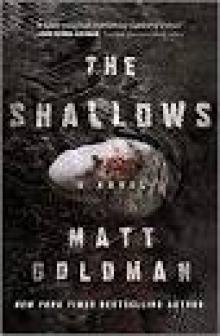 The Shallows--A Nils Shapiro Novel
The Shallows--A Nils Shapiro Novel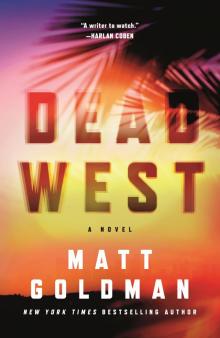 Dead West
Dead West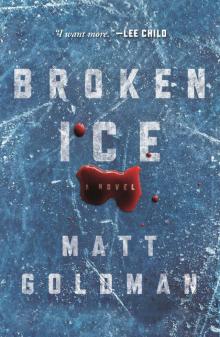 Broken Ice
Broken Ice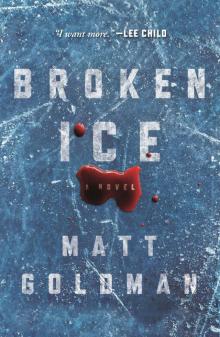 Broken Ice--A Novel
Broken Ice--A Novel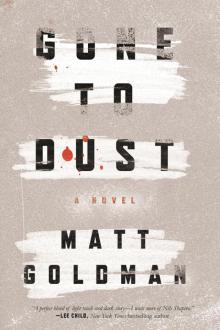 Gone to Dust
Gone to Dust